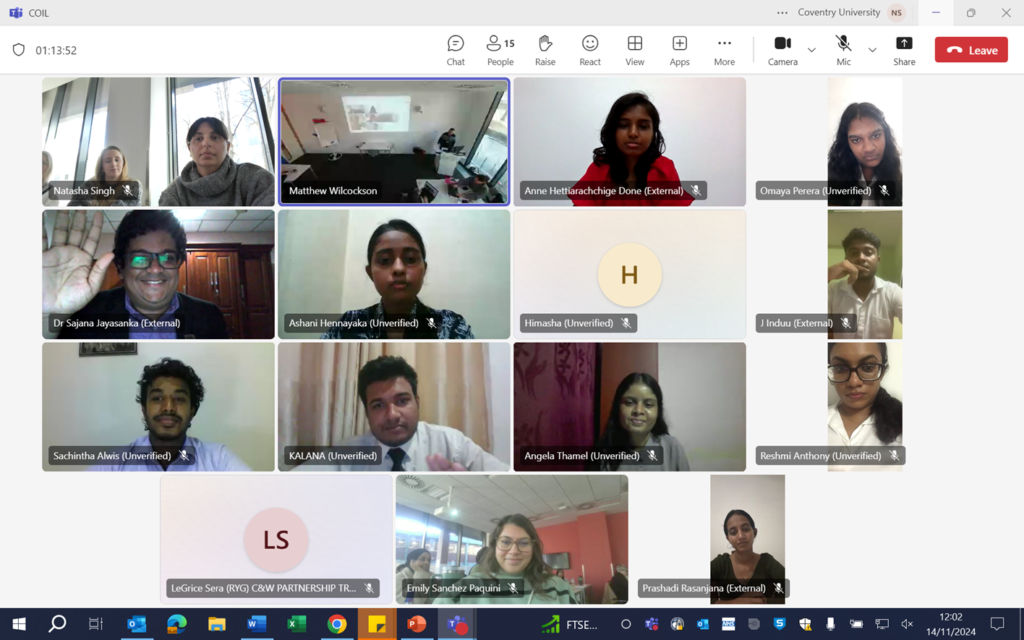Faculty of Health and Life Sciences
School of Health

Academic Year: 2023-2024
Project Leaders: Matthew Wilcockson & Dr Sajana Jayasanka
Partner University(s)/Organisation(s): IIHS Multiversity (Sri Lanka)
Project Overview:
This particular COIL project focused on enabling students to have a broader cultural understanding and awareness of Psychological Trauma (often conceptualised as Post Traumatic Stress Disorder in the West, but this term is not culture free). A number of factors are known to lead to variation across cultures in understanding of trauma in spite of some universal factors. These include acceptable forms of cultural expression of trauma (Jayawickreme and Jayawickreme 2013) and the influence of the personal identity in a cultural context, i.e. the Cultural framework that the individual is given to make meaning of the experience (Jobson and O’Kearney 2008, Liddell and Johnson 2016). Individuals are also influenced in their view of trauma by environmental factors, such as “Community trauma”, traumas befalling entire countries, and the role of respected institutions, such as religious bodies.
Two Cohorts were identified, 25 Students from a Postgraduate Diploma in CBT in the UK, and 12 students from a health professions foundation degree in Sri Lanka. It is worthy of note that both cohorts have conflicts within their cultures. CBT relies on a formal medical model for assessment and diagnosis, but an individualised maintenance cycle and greater client centeredness for treatment. Sri Lanka is a country that has been moving towards implementing a westernised model of mental health but with strong traditional cultural influences continuing to exist.
The two authors were introduced via Coventry University’s Online International Learning hub, and devised the project. They each met live with their own cohort and independently, and both countries devised a statement regarding psychological trauma in their own country. They were provided with questions about culture free case studies to help inform their thinking. They were encouraged to ask questions of the other cohort at the end of their statement. Both statements were then placed on a shared learning platform, and the students from the other cohort were encouraged to review the other parties’ statement, picking out points of interest. Students from each cohort then met again to review the other party’s statement, construct a response, and respond to the questions provided by the other party. They were provided with the following framework as a guide.
I agree that…
I don’t think I have understood…
I am curious to know more about…
We don’t share the same perspective that…
I am surprised that…
The factors influencing our differences seem to be…
There seems to be a universal understanding that…
This aspect of your report adds to my understanding…
The responses were shared on a joint learning platform but are included here for reference. Each cohort was invited to read the other party’s response and pick out salient issues for discussion in a joint online meeting. The response statements are provided here:
A joint meeting then occurred to enable students to discuss salient points. A representative from each cohort made notes, and a joint statement regarding the whole group’s perspective on Psychological trauma was constructed from the notes, highlighting the issues from both countries and the interplay between them.
The project was exceptionally interesting for both Coventry University and IIHS. The UK cohort was eagerly inquiring about the dissemination of mental healthcare facilities among all citizens in Sri Lanka for the remedies of PTSD. Sri Lanka has a free healthcare system where private sector healthcare services operate simultaneously. The affordability of the services will be demarcated due to the geographical locations of the residents. In remote villages, people have fewer facilities compared to people in urban and semi-urban areas in the country. The countrywide hospital network is endeavouring to cater for the mental healthcare of the community. Buddhist meditation and some cultural practices have also been effectively used to control PTSD. The religious and national harmony and peace have created a new trend in Sri Lanka where people are finding solutions substantially with reconciliations in a broader context. Finally, there is a huge barrier that disturbs the mitigation of this issue: a stigma towards mental health disorders, therefore certain active measures should be taken to manipulate its reduction. The awareness and health education could play a pivotal role in this matter.
At the end of this COIL project, both cohorts could reach a greater understanding of cultural conceptualisations of PTSD in both the UK and Sri Lanka.
Online Tools Used: Open Aula, Zoom, Microsoft Teams